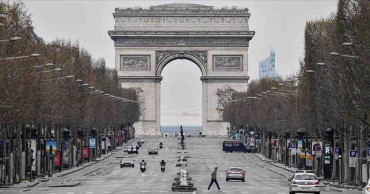vaccinated travelers
UK lifts all testing requirements for vaccinated travelers
Vaccinated travelers can enter Britain without taking any coronavirus tests starting Friday, after the government scrapped one of the final restrictions imposed over the past two years in response to COVID-19.
British residents and visitors who have had at least two doses of an approved coronavirus vaccine now only need to fill out a passenger locator form before traveling to the U.K. Unvaccinated people still have to take tests both before and after arriving but no longer need to self-isolate until they get a negative result.
Transport Secretary Grant Shapps said the U.K. “now has one of the most free-flowing borders in the world — sending a clear message that we are open for business.”
Airlines and other travel firms hailed the change as a lifeline after two years of severely constricted travel. Andrew Flintham, managing director of travel group Tui UK, said there was “a huge pent-up demand for international travel,” and people were rushing to book getaways for the February school break and April’s Easter holiday.
Gatwick, London’s second-busiest airport, said that it plans next month to reopen the second of its two terminals, shuttered since June 2020.
British Airways chief executive Sean Doyle urged other countries to follow Britain’s “pragmatic approach.”
But some scientists worry the government is moving too fast. Prime Minister Boris Johnson’s Conservative government lifted most domestic rules last month. Face masks are no longer mandatory in most indoor spaces in England, vaccine passports for gaining entry to nightclubs and large-scale events were scrapped, as was the official advice to work from home. Other parts of the U.K. — Scotland, Wales and Northern Ireland — have also lifted most restrictions.
Read: UK defense secretary in Moscow amid Ukraine tensions
Johnson announced this week that he hopes to lift the final restriction — mandatory self-isolation for people who test positive — by the end of February as part of a plan to live long-term with COVID-19. Officials have said the government plans to switch from legal restrictions to advisory measures and treat the coronavirus more like the flu as it becomes endemic in the country.
Scientists expressed surprise at Johnson’s announcement. Tim Spector, an epidemiologist at Kings College London, said it was “more a political type of statement rather than a scientific one.”
“There is some rationale to this and other countries are doing things similar, but it’s clearly a race for the government to say that ‘Britain is first, Britain is the first to come out of this, Britain has conquered omicron, our booster program is world beating etc, etc,’” he told Times Radio.
The re-opening came as statistics showed the U.K. economy grew by a bigger-than-expected 7.5% in 2021, despite an omicron-driven slowdown at the end of the year. The re-imposition of some restrictions in response to the highly transmissible variant brought a 0.2% contraction in December.
The Office for National Statistics said the growth follows a 9.4% contraction in 2020 as the pandemic shut down big chunks of the economy. The U.K. economy is now back to the size it was in February 2020, just before the new coronavirus swept the U.K.
Britain has Europe’s highest coronavirus toll after Russia, with more than 159,000 officially recorded deaths. The country has seen a drop in both new infections and COVID-19 patients admitted to hospitals since the peak of the omicron spike in early January.
Officials have credited the government’s booster jab program with preventing the surge in omicron cases from causing serious stress to U.K. hospitals. In Britain, 84.6% of people 12 and up have had two doses of a vaccine and almost two-thirds have had a third, booster shot.
4 years ago
Australia to open borders to vaccinated travelers on Feb. 21
Australia will open its borders to all vaccinated tourists and business travelers from Feb. 21 in a further relaxation of pandemic restrictions announced Monday.
Australia imposed some of the world’s toughest travel restrictions on its citizens and permanent residents in March 2020 to prevent them from bringing COVID-19 home.
When the border restrictions were relaxed in November in response to an increasing vaccination rate among the Australian population, international students and skilled migrants were prioritized over tourists in being welcomed back to Australia.
Prime Minister Scott Morrison said his senior ministers agreed on Monday that the border would reopen to all vaccinated visas holders from Feb. 21.
Morrison said visitors must have proof of vaccination. He referred to Serbian tennis star Novak Djokovic being deported by the Australian government last month because he was not vaccinated against coronavirus.
“Events earlier in the year should have sent a very clear message, I think, to everyone around the world that that is the requirement to enter into Australia,” Morrison said.
Home Affairs Minister Karen Andrews said visitors who could provide proof of a medical reason why they could not be vaccinated could apply for a travel exemption.
Read: UN experts: North Korea stealing millions in cyber attacks
Tourist operators have been lobbying the government to bring tourists back sooner. The southern hemisphere summer is in its final month.
The Australian Tourism Export Council, the peak industry body representing the nation’s tourism export sector, said tourism operations were looking forward to rebuilding their markets.
“Australian tourism businesses will rejoice in the news that our borders will reopen to all international travelers,” the council’s managing director Peter Shelley said in a statement.
“It’s been a long, hard and desperate road for every tourism business across the country and we have lost many along the way, but this news will give those who have survived a clear target to work towards and a start point for the rebuilding of the industry,” Shelley added.
4 years ago
France eases entry rules for vaccinated travelers from U.K.
France will let in travelers from Britain who are vaccinated against COVID-19 without having to self-isolate or to offer a valid reason for the trip, the French prime minister said on Thursday.
Prime Minister Jean Castex said travel restrictions will be eased starting Friday because the highly-contagious omicron variant is now largely dominant in both countries.
Read: Omicron’s New Year’s cocktail: Sorrow, fear, hope for 2022
In mid-December, France had limited the breath of what it considered valid reasons for traveling to the country and required a 48-hour isolation upon arrival in efforts to slow down the spread of omicron, which was more widespread in the U.K. at the time.
All those arriving from Britain must present a negative virus test taken within the previous 24 hours.
Unvaccinated travelers arriving from U.K. must still provide a valid reason for travelling and undergo a 10-day quarantine under police supervision.
Read: French kids line up to get vaccine shots as omicron spreads
France, which has one of Europe’s most-vaccinated populations, reported this week a daily record of more than 368,000 new coronavirus cases. The seven-day average of new cases is close to 270,000, which as resulted in a rise in hospitalizations.
4 years ago
Australia's Queensland state to open to vaccinated travelers
Australia’s Queensland state announced plans Monday to open up to vaccinated travelers, ending the status it has enjoyed throughout the pandemic of remaining virtually free of COVID-19.
Queensland and Western Australia have been among the states most successful in keeping COVID-19 out, and they also were among the most reluctant to relax their strict border controls after the highly contagious delta variant took hold in New South Wales state in June and spread through Victoria and the Australian Capital Territory.
Queensland authorities warned infection rates would rise and remain high for months.
Read:Australia official urges against AstraZeneca
“For almost 600 days for nearly two years we have kept the virus out of Queensland,” Treasurer Cameron Dick said. “Those days will soon come to an end. This will be the end of the zero COVID for Queensland."
Queensland Premier Annastacia Palaszczuk said fully vaccinated travelers would be allowed into the state without quarantining when 80% of the state’s population aged 16 and older was vaccinated. That benchmark is expected to be achieved by Dec. 17.
Travelers would also need to test negative to COVID-19 within three days before entering the state.
Read:Australia battles several clusters in new pandemic phase
Vaccinated travelers will be allowed into Queensland when 70% of the target population is vaccinated, a target expected to be reached by Nov. 19, but will face restrictions including 14 days of quarantine on arrival.
“I think Queenslanders will acknowledge that that is a sensible and cautious approach to ensure that families can be reunited but the people coming into Queensland will have to be fully vaccinated,” Palaszczuk said. “The faster we are vaccinated, the faster these deadlines will be achieved.”
4 years ago







